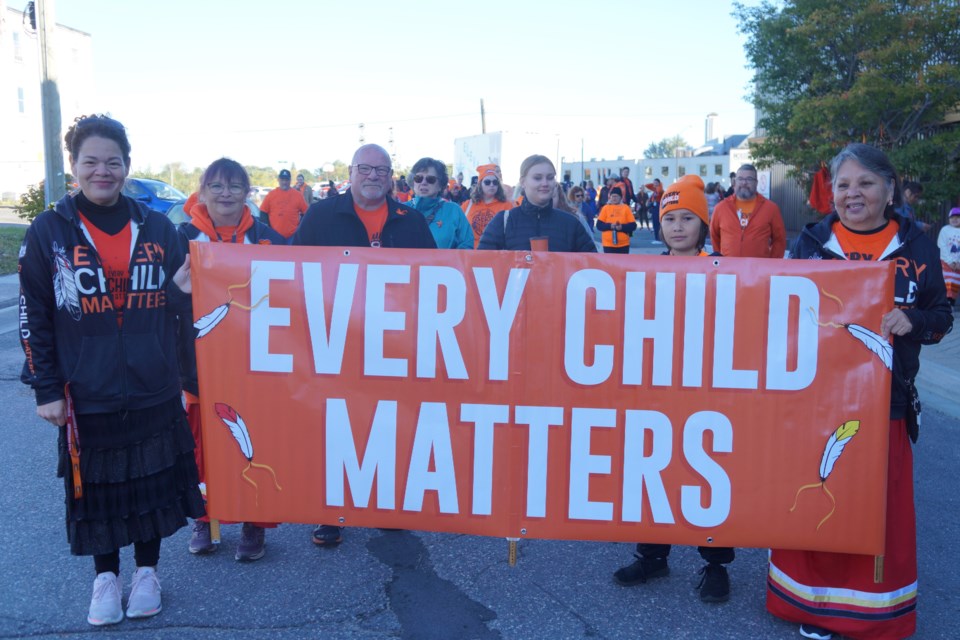The day began at sunrise with the building of a sacred fire, and continued with a walk of remembrance from N’Swakamok Friendship Centre to the Bell Park Amphitheatre, where hundreds of school children and those who wish to honour the National Day for Truth and Reconciliation came together.
It was a day for healing, said Jim Eshkawkogan, elder and knowledge keeper from Wiikwemkoong Unceded Territory. He spoke at the opening ceremonies and ensured that those watching understood the importance of the seven grandfather teachings, (Love, Respect, Bravery, Truth, Honesty, Humility & Wisdom) especially on a day to remember those who attended the residential schools, and those who never came home.
“We need understanding,” said Eshkawkogan. “Because the things we don’t understand, we try to destroy.”
He told the audience that there is the need to be humble, to practice humility, and see that “we are all human beings.”
Eshkawkogan said it was important to remember that the seven grandfather teachings are not only for Indigenous people.
“We say native teachings or Indigenous teachings, but they are human teachings,” he said. “These are lessons for all of us.” He added that while he was “still on the road to regaining his ancestors,” he was pleased that so many had come to honour those who lost their loved ones, or their identity.
Trudy Jones, drummer and singer, joined Angela Recollet of Shkagamik-Kwe on stage and sang a song of thanks, giving gratitude to the hundreds that had come to the Grace Hartman Amphitheatre. The performance was powerful and overwhelming for many in the audience. Playwright and artist Sarah Gartshore, who took to the stage to introduce her play, ‘Debwewin’ (Truth), said that Jones’ performance was so powerful that “she left all her medicines on stage” for the audience.
Before the performance, Gartshore reminded the audience that what they saw could be difficult and that they needed to be “gentle with your heart.” She also reminded them that “we are only as safe as the least safe around us,” and to take care of eachother.
Hosted by the Indigenous Collection of Sudbury, the events were supported by the city of Sudbury, Shkagamik-Kwe Health Centre and the Friendship Centre. Debwewin (Truth) was shown to the school children in an age appropriate way; the afternoon performance will feature a more honest and raw examination of the residential school systems and the long lasting effects they have had.
Later today, you can see more performances at the amphitheatre, including dancing, drumming and singing, and the Sudbury Indie Cinema will host two screenings of Cinéfest Sudbury selection Stories of Decolonization: (De)Colonial Relations in honour of The National Day for Truth and Reconciliation.
Today also marked the culmination of the GSPS Relay for Reconciliation, a month-long relay that asked GSPS officers to log their kilometers until they reached 10,000, the number of children that never came home. (Though they acknowledge that the search continues, and that number may be higher.)
Organized by GSPS Const. Anik Dennie and Const. Katrina Pitawanakwat, the relay’s closing ceremony was held today.
Each GSPS member participating in the Relay for Reconciliation completed a 1-hour course entitled “Reflection on Truth and Reconciliation”, where they learned about the calls to action brought forward by the Truth and Reconciliation Commission of Canada.
Then, beginning Sept. 1, each of the 104 GSPS participants logged their daily distance, reaching 11,472 kilometres today.
“A leader isn’t a role, a position. Leadership is actions, and these officers showed that leadership, what’s needed for healing,” Pederson said.
At a ceremony to acknowledge the day and the achievements, there was an opening prayer and thank you from Julie Ozawagosh, a second generation survivor of St. Joseph’s School for Girls in Spanish.
She asked that those in attendance think of Phyllis Webstad, who lost her orange shirt on her first day of residential school and whose work to regain her voice brought “Orange Shirt Day” to fruition, but also, to acknowledge the work that Ozawagosh had to do to find her voice.
“Everything that we had carried, our voice, for a long time, was never heard,” she said. “It took me a long time to be able to use my voice. For so long, I thought I wouldn’t be able to speak and share my story, or even just to be in a circle with all of you, to be able to share our knowledge, to share ceremony, to share teachings, so that it will connect from spirit to spirit. I am grateful to be here today.”
For more information, visit the National Centre for Truth and Reconciliation website, found here.
If you are struggling today or anyday, please see resources below.
Indian Residential Schools Crisis Line: 1-866-925-4419
Indian Residential Schools Survivors Society: 1-800-721-0066
National Inquiry into Missing and Murdered Indigenous Women and Girls’ Toll-free Support Phone Line: 1-844-413-6649
Jenny Lamothe is a reporter with Sudbury.com. She covers the diverse communities of Sudbury, especially the vulnerable or marginalized, including the Black, Indigenous, newcomer and Francophone communities, as well as 2SLGBTQ+ and issues of the downtown core.
